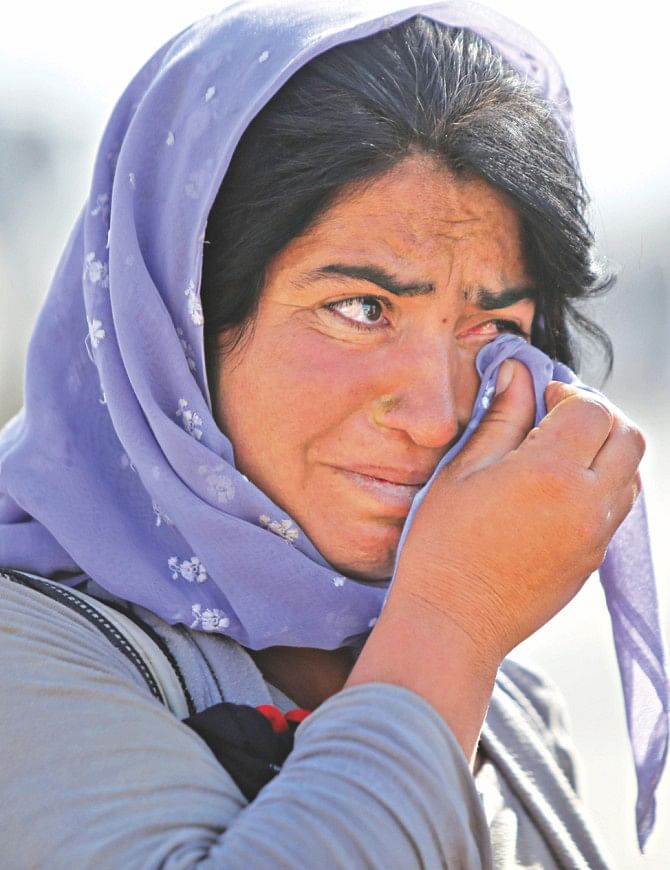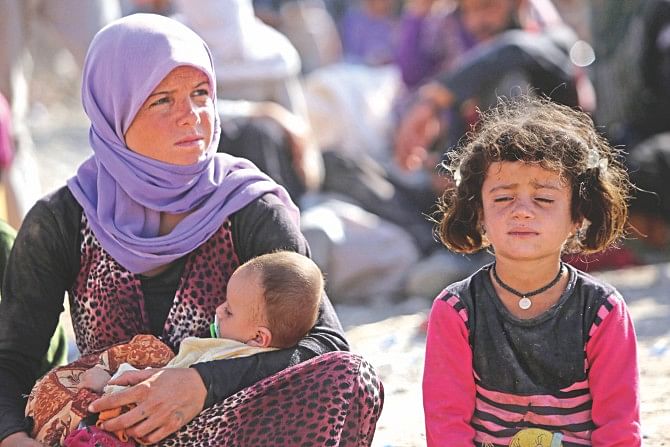IS insurgents 'massacre' 80 Yazidis in Iraq
IS insurgents 'massacre' 80 Yazidis in Iraq
US strikes jihadists as Kurds battle to retake key dam

Islamic State militants "massacred" some 80 members of Iraq's Yazidi minority in a village in the country's north, a Yazidi lawmaker said as Kurdish troops backed by US warplanes yesterday launched a bid to recapture Mosul dam.
"They arrived in vehicles and they started their killing this afternoon," senior Kurdish official Hoshiyar Zebari told Reuters. "We believe it's because of their creed: convert or be killed."
A Yazidi lawmaker and another senior Kurdish official also said the killings had taken place and that the women of the village were kidnapped.
A push by Islamic State militants through northern Iraq to the border with the Kurdish region has alarmed the Baghdad government, drawn the first US air strikes since the end of American occupation in 2001 and sent tens of thousands of Yazidis and Christians fleeing for their lives.
Yazidi parliamentarian Mahama Khalil said he had spoken to villagers who had survived the attack. They said the killings took place during a one-hour period.
The resident of a nearby village said an Islamic State fighter from the same area gave him details of the bloodshed.
"He told me that the Islamic State had spent five days trying to persuade villagers to convert to Islam and that a long lecture was delivered about the subject today," said the villager. "He then said the men were gathered and shot dead. The women and girls were probably taken to Tal Afar because that is where the foreign fighters are."
That account could not be independently confirmed.
Islamic State militants have killed at least 500 members of Iraq's Yazidi ethnic minority during their offensive in the north, Iraq's human rights minister told Reuters.
Mohammed Shia al-Sudani said the Sunni militants had also buried alive some of their victims, including women and children. Some 300 women were kidnapped as slaves, he added.

Meanwhile, Kurdish troops backed by US warplanes yesterday launched a bid to recapture Mosul dam, Iraq's largest, from jihadists, a senior Kurdish military official said.
"Kurdish peshmerga, with US air support, have seized control of the eastern side of the dam" complex, Major General Abdelrahman Korini told AFP.
"We killed several members of Daash. We are still advancing and in the coming hours should announce welcome news," he said, using the old Arabic acronym for the Islamic State jihadist group.
Witnesses said the air strikes started early in the morning and reported that fighting was ongoing in the afternoon.
Peshmerga forces lost control of the dam on August 7 as IS fighters were sweeping the region, conquering one village after another and seizing other key infrastructure such as oil wells.
The dam on the Tigris river, on the southern shores of Mosul lake about 50 kilometres north of the city, provides electricity to much of the region and is crucial to irrigation in vast farming areas in Nineveh province.
A 2007 letter to the premier, Nuri al-Maliki, sent by then US ambassador Ryan Crocker and the former commander of US forces in Iraq, David Petraeus, warned of the consequences of a disaster at the dam, which was assessed to have serious structural weaknesses.
"A catastrophic failure of Mosul dam would result in flooding along the Tigris river all the way to Baghdad," the letter read.
"Assuming a worst case scenario, an instantaneous failure of Mosul dam filled to its maximum operating level could result in a flood wave 20 metres deep at the city of Mosul," it said.
The Islamic State has already resorted to the weaponisation of dams, as was the case earlier this year when it flooded large areas around the city of Fallujah, west of Baghdad.
However Mosul is the main stronghold of the Iraqi part of the Islamic State's self-proclaimed "caliphate", and the dam would be an important part of its own economy and state-building efforts.